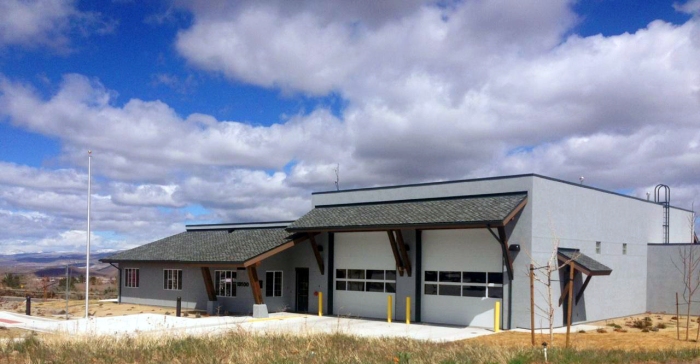by LINDSAY TOSTE
Clik here to view.

The Truckee Meadows Fire Protection District would merge with the Sierra Fire Protection District if AB 302 passed. / Photo by Lindsay Toste
Due to a $4.1 million decrease in funds over the last two years, the Truckee Meadows Fire Protection District was threatened with closing down up to four fire stations within its jurisdiction. Because of these budget cuts, the Truckee Meadows Fire Protection District Board of Fire Commissioners has already cut the regular staffing at each fire station from four individuals to three. To avoid further cuts in staffing and the potential shut down of multiple fire stations, the TMFPD has proposed the official merging of their fire department with the Sierra Fire Protection District. The Committee on Government Affairs met this morning to discuss AB 302, a measure to finalize the consolidation of the two fire departments’ jurisdictions.
The TMFPD and SFPD currently work collaboratively through inter-local agreements. But despite the fact that the two departments are currently operating as one, they are still considered two distinct and separate entities. Two separate auditing reports are performed, and a $1 million emergency wildfire budget is allocated to each fire department. In merging the fire departments, the current bill proposes to decrease the overall emergency wildfire budget to $1.5 million for both districts. In opening up this revenue, the merger would allow all fire stations within these districts to stay open and operational with adequate staffing.
Because the fire departments’ revenue is derived from property taxes and the percentage allocated is based on the total assessed value within a jurisdiction, existing law states the merging between two fire protection districts can only occur if the assessed property value of each district is relatively equal. The bill seeks to eliminate the line between the districts these two fire departments serve; however, they have substantially different assessed values.
The first, TMFPD, encompasses Sun Valley, Golden Valley, and North Valleys and has lower average property values. SFPD covers higher property values in areas such as Galena, Washoe Valley and Peavine. There is some concern that higher property values in current SFPD areas might inadvertently raise taxes for those in lower property value districts, and the services provided may not directly apply to those taxpayers.
Those in opposition to the bill claim that it prevents citizens from having a vote in the matter and believe the consolidation could hike up their property tax rates with no return in the form of elevated fire protection services. As the bill states, it is an option for the Board of County Commissioners to consolidate the two fire protection districts without the consent or petition of the public.
President of the Reno Firefighter Association, Dennis Jacobsen, expressed his concerns for supplying his tax dollars to services outside his district.
“Because of the inequities being pointed out between these two districts, some of my tax dollars are being used to support fire services in jurisdictions that aren’t currently my tax space,” Jacobsen said. “I want to know that my tax dollar is going to my neighborhood and not to some other location within the county.”
Jacobsen points out the lack of consideration for public opinion in the fire stations’ collaboration by leaving the decision up to the Board of County Commissioners.
“With the assertion of this language throughout this entire bill, in my opinion, it’s enabling the ability of a few individuals to make decisions outside the public will,” Jacobson said.
Supporters of the bill argue that the merger will create a more efficient use of government funds and provide sufficient fire services.
Charles Moore, Fire Chief at TMFPD, said, “The essential question was not equalizing taxes, it was keeping our fire stations open. Closing any one of our fire stations would have an enormous impact on response times and to our constituents.”
“We are totally convinced,” Moore continued, “that as the economy starts to get better, and we are financially stable, both in the short term and the long term, then the Board of the Commissioners has the option to lower taxes or increase the service level, or both.”
“We’re just really trying to consolidate the inter-local agreements into one solid, established ward and one district,” Moore said.
Sponsor of AB 302, Assemblyman Randy Kirner, said in his closing statement, “The key here is that this bill only completes what is already in progress. This bill allows the fire stations to stay open. It services our community better and provides the kind of protection our citizens need.”
Image may be NSFW.
Clik here to view.
Clik here to view.
